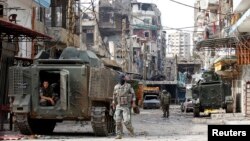At least 30 people were reported killed as Lebanese security forces battled Islamist militants during the weekend in the northern city of Tripoli. Tensions in Lebanon continue to be fueled by the kidnapping of Lebanese soldiers and war in neighboring Syria.
A video posted on YouTube by the al-Qaida linked group al-Nusra claims to show nine captured Lebanese soldiers who are among dozens missing after earlier battles with Islamist militants. Two more soldiers were taken during the weekend. Three have been executed since being captured.
Al-Nusra threatened to kill another Lebanese soldier on Sunday in retaliation for the battles in Tripoli, but has since agreed to postpone at the request of Muslim clerics.
Meanwhile, the jihadist group Islamic State released a new propaganda video of John Cantlie, a British journalist taken hostage in Syria, after his sister pleaded for the militants to restart negotiations.
In the video Cantlie describes some of his two-year ordeal, without showing emotion or fear.
“Now unless we tried something stupid like escaping or doing something we should not, we were treated well by the Islamic State," he said. "Some of us who tried to escape were water-boarded by our captors as Muslim prisoners are water-boarded by their American captors.”
Tripoli quiet, tense
Guns appeared to fall silent in Tripoli on Monday after two days of battles between the army and Islamist gunmen, some of the worst fighting to spill over into Lebanon from Syria's civil war next door.
Security officials and politicians said the army had retaken ground from the Islamist fighters after a battle in which at least 11 soldiers and eight civilians were killed.
The area taken by the army on Monday included a mosque being used as a base by the gunmen in Tripoli's Bab al-Tabbaneh area. Civilians had earlier been allowed to leave under a humanitarian cease-fire requested by local Sunni leaders.
A brief gunfight ensued as soldiers entered and started to comb the area.
It was not immediately clear where the gunmen had gone. Security sources said some may have left with the civilians.
The quieter morning followed battles overnight between the army and gunmen in areas surrounding Tripoli, a predominantly Sunni Muslim city where fighting linked to Syria's civil war has erupted several times in the last three years.
Fighting has also taken place in other parts of the north, near the towns of al-Minya and Bahneen, where at least two soldiers were killed in an ambush. The army used helicopter gunships to fire at militant positions for the first time in recent years.
“The operation is over and the army is entering areas where the gunmen were entrenched in order to clear them,” Samir Jisr, a Sunni politician from Tripoli, told Reuters.
A security source said the army had yet to take one final position being held by the gunmen.
Worst instability since Lebanon's civil war
The fighting marks the worst spillover of Syria-related violence into Lebanon since early August, when Islamist insurgents affiliated to the Nusra Front and Islamic State staged an incursion into the border town of Arsal and took around 20 soldiers captive. Three have been executed.
The instability is also the worst since Lebanon's 1975-90 civil war. There have been several rounds of fighting in Tripoli since the Syria war erupted in 2011.
The Syria war has sharply divided its smaller neighbor along sectarian lines, with Sunnis supporting Syrian rebels or Jihadi militants and Shi'ites backing President Bashar al-Assad. Political conflict has left Lebanon without a president since February when the term of President Michel Suleiman expired.
Politicians across Lebanon's deeply divided political field have condemned the violence in Tripoli, Lebanon's second largest city and a historic base for Sunni Islamist groups.
‘Necessary’ confrontation
Prime Minister Tammam Salam, who met ministers and security officials on Monday, said “it was necessary to continue the confrontation,” his office said in a statement.
“The government stands united behind the legitimate military security forces in the battle they are fighting to strike the terrorists and restore security to Tripoli and the north.”
While it is not clear whether the powerful Sunni Islamist groupsal-Nusra or Islamic State took part in the Tripoli battle, it did pit Sunni Islamists against Lebanon's army, which has been accused of being allied to the Lebanese Shi'ite militant group and political party Hezbollah.
Security sources say fighters include both Lebanese and Syrian supporters of Islamic State and the Nusra Front.
The Nusra Front is the Syrian affiliate of al-Qaida. Islamic State is an al-Qaida offshoot that controls swaths of both Syria and Iraq, targeted by a U.S.-led campaign of air strikes in those two countries.
Lebanese Interior Minister Nohad Machnouk said in remarks published on Monday that the Tripoli gunmen numbered no more than 200 and were from both Lebanon and Syria.
Many Sunni Syrian rebels and hardline Lebanese Sunni Islamists accuse Lebanon's army of working with the Lebanese Shi'ite movement Hezbollah, which has sent fighters to aid Syrian President Bashar al-Assad, a member of the Shi'ite-derived Alawite minority.
The Nusra Front has threatened to execute Lebanese soldiers taken captive during the Arsal incursion in response to the Lebanese army operation in Tripoli.
Some material in this report was provided by Reuters.





